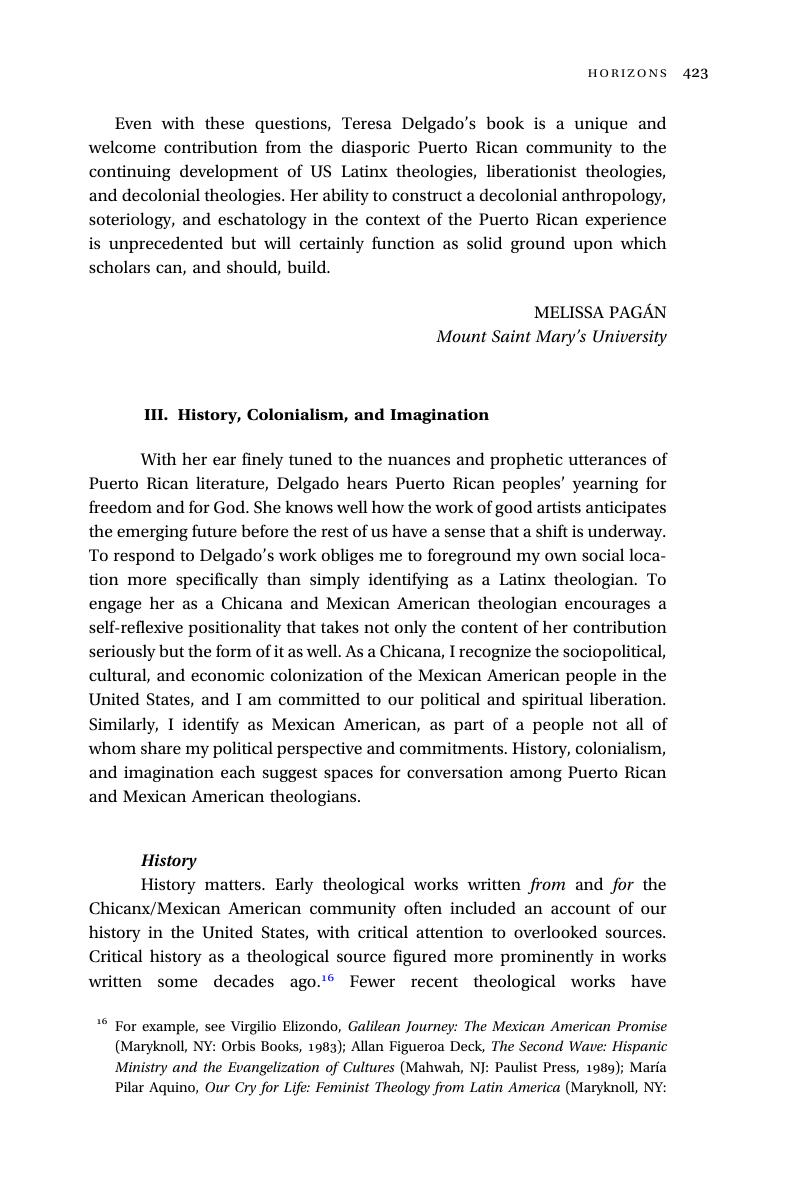No CrossRef data available.
Article contents
A Puerto Rican Decolonial Theology: Prophesy Freedom. Four Perspectives – III. History, Colonialism, and Imagination - A Puerto Rican Decolonial Theology: Prophesy Freedom. By Teresa Delgado. Cham, Switzerland: Palgrave Macmillan, 2017. xv + 204 pages. $99.00.
Review products
Published online by Cambridge University Press: 29 November 2018
Abstract

- Type
- Review Symposium
- Information
- Copyright
- Copyright © College Theology Society 2018
References
16 For example, see Elizondo, Virgilio, Galilean Journey: The Mexican American Promise (Maryknoll, NY: Orbis Books, 1983)Google Scholar; Deck, Allan Figueroa, The Second Wave: Hispanic Ministry and the Evangelization of Cultures (Mahwah, NJ: Paulist Press, 1989)Google Scholar; Aquino, María Pilar, Our Cry for Life: Feminist Theology from Latin America (Maryknoll, NY: Orbis Books, 1993)Google Scholar; Fernandez, Eduardo C., La Cosecha: Harvesting Contemporary United States Hispanic Theology (1972–1988) (Collegeville, MN: Liturgical Press, 2000)Google Scholar.
17 One exception is Sanchez, David A., From Patmos to the Barrio: Subverting Imperial Myths (Minneapolis, MN: Fortress Press, 2008)Google Scholar.
18 Katie Reilly, “Here Are All the Times Donald Trump Insulted Mexico,” Time, August 31, 2016, http://time.com/4473972/donald-trump.
19 Ibid.
20 Greenburg, Amy S., A Wicked War: Polk, Clay, Lincoln, and the 1846 U.S. Invasion of Mexico (New York: Alfred A Knopf, 2012)Google Scholar.
21 Ibid., xviii.
22 Carrigan, William D. and Webb, Clive, Forgotten Dead: Mob Violence against Mexicans in the United States, 1848–1928 (Oxford: Oxford University Press, 2013)Google Scholar.
23 Coyolxauhqui is the Mexican Nahuatl dismembered goddess of the moon. In Anzaldúa's words, “The warrior goddess's eyes are closed; she has bells on her cheeks, and her head is in the form of a snail design. Decapitated by her brother, Huitzilopochtli (Eastern Hummingbird and War God), Coyolxauhqui exemplifies women as conquered bodies. Her bones jutting from sockets call to mind the dominant culture's repeated attempts to tear U.S. Mexican culture apart and scatter the fragments to the winds.” Anzaldúa, Gloria E., Light in the Dark/Luz en lo Oscuro: Rewriting Identity, Spirituality, Reality, ed. Keating, AnaLouise (Durham, NC: Duke University Press, 2015), 49CrossRefGoogle Scholar.
24 Anzaldúa, Light in the Dark, 17.
25 Ibid., 14–15.
26 Ibid., 17.
27 Ibid., 124.
28 Pineda-Madrid, Nancy, Suffering and Salvation in Ciudad Juárez (Minneapolis, MN: Fortress Press, 2011)CrossRefGoogle Scholar.


